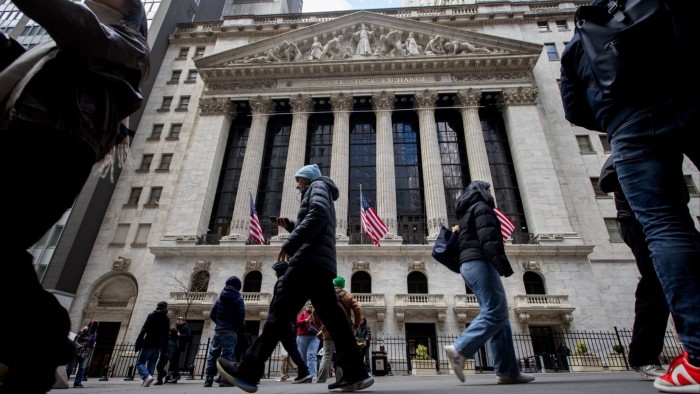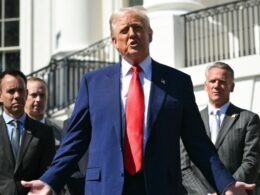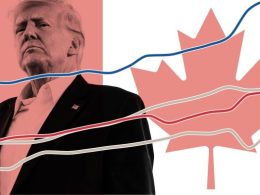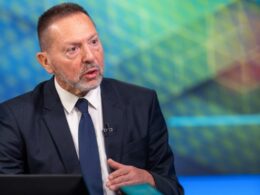One scoop to start: Computer-driven hedge fund Renaissance Technologies was wrongfooted after Donald Trump’s “liberation day” tariff announcement last week sent shockwaves across global financial markets.
And another thing: The UK government is considering nationalising British Steel, as Sir Keir Starmer on Tuesday vowed to do “everything we can to ensure there’s a bright future” for the Chinese-owned steelmaker’s main site.
Welcome to Due Diligence, your briefing on dealmaking, private equity and corporate finance. This article is an on-site version of the newsletter. Premium subscribers can sign up here to get the newsletter delivered every Tuesday to Friday. Standard subscribers can upgrade to Premium here, or explore all FT newsletters. Get in touch with us anytime: Due.Diligence@ft.com
In today’s newsletter:
-
The great US investment debate
-
Phillips 66 puts up a fight
-
Traders are set to bail out bankers
An existential test for Wall Street’s global dominance
America may not be the manufacturing power it was in the first half of the 20th century. But over the past few decades it has been a massive exporter of high finance.
The first hedge fund was started in the US — founded in 1949 and called AW Jones — and so were the first mainstream leveraged buyouts, a model KKR pioneered in the 1970s.
The epicentre of the lucrative venture capital world has for decades been dominated by firms within a small radius in California. The US has almost single-handedly ushered in the rise of private markets, which now stand at more than $13tn.
Pensions, savings plans and sovereign wealth funds from every corner of the globe have ploughed their cash into the hands of American finance titans in search of lucrative returns.
Yet less than 100 days into Donald Trump’s second tour in the White House, the construct that gave rise to countless US finance billionaires is being challenged to its core, notes DD’s Sujeet Indap in a sharp Lex note.
An onslaught of tariffs, which threatens to derail the global trading system, will also have under-appreciated ramifications on the frictionless flow of capital.
Trump’s aggressive trade posture isn’t just causing a slump in deals. It may cause sovereign wealth funds from Asia, Scandinavia and the Middle East to think more carefully about wiring their money to Manhattan.
Worse, executives are starting to worry that tariff-hit foreign governments may come to dislike US-based funds buying their national assets.
As Lex notes, these fears are reflected in the falling stock multiples of Wall Street titans such as Blackstone, Apollo and Blue Owl, as well as independent financial advisory groups.
Finance executives are growing increasingly worried and some alarming soundbites have surfaced.
David Colosimo, head of fixed interest at UniSuper, said on a podcast last Friday that his fund had quite a large exposure to US assets and in the future he would be “questioning that commitment”.
“Frankly, I think we’ve seen peak investment in US assets,” he said, adding Trump had been “horrible for business”.
Some optimists are still out there. Money after all seeks to make money and America has for decades obliged the cash sloshing around the globe.
In an interview with the FT, Mark Delaney, the chief investment officer of AustralianSuper, which manages $223bn of assets, said the US still looks like the most attractive investment region long-term.
The firm still has half of its international exposure in the US, and it hasn’t cut that in recent weeks.
DD will be keeping tabs on whether others are so sanguine.
Elliott faces hurdle with its latest target
One of Elliott Management’s highest octane activist campaigns in recent years took another dramatic turn on Tuesday as oil refiner Phillips 66 fired back at the hedge fund calling its shake-up plan “unrealistic”.
Phillips 66 formally nominated its slate of four board directors ahead of its May 21 annual meeting. The filing came days after Elliott unveiled its four board nominees.
This is only the fourth instance where proxy voting materials have been mailed to shareholders in Elliott’s history of facing off against US corporations.
Previous fights have played out at oil and gas major Hess, aluminium products company Arconic and most recently Southwest Airlines.
The Houston-based oil refiner, which was carved out of ConocoPhillips in 2012, accused Elliott of pursuing “a quick win” in its push for Phillips 66 to sell assets, including its midstream business and chemicals joint venture with Chevron.
Earlier this year, Elliott doubled its stake in Phillips 66 to more than $2.5bn after first investing in 2023. Shares in Phillips 66 are down 18 per cent this year to $92, giving the refiner a market value of nearly $38bn.
Elliott has pointed to how the energy company’s shares have lagged behind rivals Marathon Petroleum and Valero Energy in recent years, arguing its share price could reach $200.
The activist investor has also called for Phillips 66 to review its executive leadership team and to refocus on its core refining business.
“Elliott continues to use its activist playbook to avoid collaboration, cloud the discussion and drive a false narrative to promote their short-term agenda,” said Phillips 66 in its so-called fight letter published on Tuesday.
It added the activist investor “wants a quick win by breaking up the company, based on inflated and unrealistic assumptions”.
Elliott has, however, held several energy investments for the best part of a decade, including Hess and Marathon Petroleum, a person briefed on hedge fund’s thinking noted.
Not long after Phillips 66 published its fight letter, Elliott barked back with the launch of a podcast, called Streamline 66, which features one-to-one conversations with its own board nominees.
First up was Brian Coffman, a former ConocoPhillips executive: his verdict was the argument that Phillip 66’s refineries are “old and tired” is false.
Coffman told the podcast that after starting at predecessor Phillips in 1983, he was excited by the prospect of “restoring the performance of that refining company to what it has been historically”.
Wall Street traders make it rain
While the number of deals has remained subdued, another pocket of Wall Street bankers has been making a killing lately: traders.
With all the market ructions during the Trump administration’s first few months, traders were able to pull in what’s expected to be their best quarter in more than a decade.
That’s a saving grace for banks, whose investment bankers have suffered from a period of little activity and disappointing fees.
In the first-quarter earnings that are set to come out in the coming weeks, Goldman Sachs, JPMorgan Chase, Morgan Stanley, Bank of America and Citigroup are collectively expected to report about $34.5bn in revenues from equities and fixed-income trading.
That’s up 10 per cent from a year earlier, the highest rate since at least the beginning of 2014, according to data from Bloomberg and Visible Alpha.
Meanwhile, total revenue from investment banking at those five banks is expected to rise just 3 per cent, to about $7.65bn.
All of the market gyrations that have led to planned public listings and acquisitions being paused have had the inverse effect for traders, who have happily bought and sold securities for clients.
But even with the bumper revenues for the start of the year, there are concerns that the longer uncertainty drags on, the more likely it is that clients will stay on the sidelines — seizing up fees for everyone.
“There’s a lot of volatility, people trading around events and movements,” said Saul Martinez, a banking analyst at HSBC. “But if bad volatility leads to risk-off [from investors], that’s not good for trading down the line.”
Job moves
-
BlackRock’s infrastructure division GIP has hired Gonzalo Garcia as a partner in London, a person familiar with the matter told DD. He previously worked for more than two decades at Goldman Sachs, where he was most recently co-head of Emea investment banking.
-
C Street Advisory Group has hired Emma Quigley as a senior vice-president. She previously worked for Blackstone, where she was the chief of staff to the global head of corporate affairs.
-
Apollo Global Management has hired Kevin Pluff as a partner and co-head of capital markets, Bloomberg reports. He was previously head of capital markets at HPS Investment Partners.
-
Sidley has hired Dave Perkins as a partner for the firm’s M&A and private equity group in New York. He was previously the co-head of private equity at Cravath, Swaine & Moore.
Smart reads
Wartime troubles Europe’s most valuable defence tech start-up is poised to make a fortune as EU countries are eager to spend big on security, Bloomberg reports. But the company has some unhappy customers.
Hooked on oil After a plunge in crude prices, oil-reliant Saudi Arabia faces growing pressure to raise debt or slash spending, Reuters writes. That might complicate its plans to diversify its economy.
It’s back, baby The Treasury basis trade — loved by some hedge funds and reviled by regulators — is rearing its head again, Alphaville writes.
News round-up
UK considers nationalising British Steel (FT)
Revolut fined €3.5mn over money laundering control failures (FT)
Bain Capital clinches $2.6bn deal to buy Blackstone-backed HealthEdge (FT)
Porsche sales drop despite jump in US demand (FT)
BDO probed over its audit of crisis-hit homeless housing fund (FT)
UK financial watchdog cuts fees for first time in more than a decade (FT)
EQT nears €2.6bn deal with EQT for E45 maker Karo Healthcare (FT)
Companies sued for £360mn in damages over Grenfell Tower fire (FT)
Due Diligence is written by Arash Massoudi, Ivan Levingston, Ortenca Aliaj, and Robert Smith in London, James Fontanella-Khan, Sujeet Indap, Eric Platt, Antoine Gara, Amelia Pollard and Maria Heeter in New York, Kaye Wiggins in Hong Kong, George Hammond and Tabby Kinder in San Francisco. Please send feedback to due.diligence@ft.com
Recommended newsletters for you
Source link









